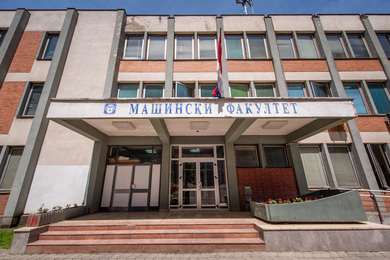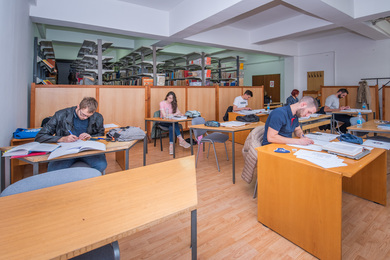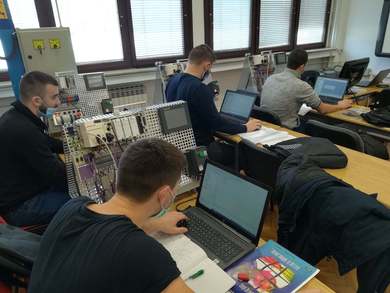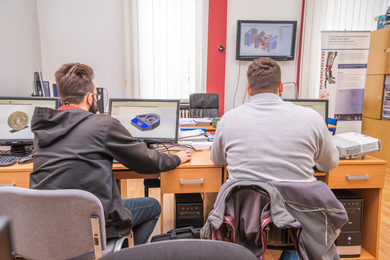Faculties
Faculty of Mechanical Engineering
The history of the Faculty of Mechanical Engineering starts with the initiative of the Banja Luka Municipal Assembly, which had a session on 3 February 1971 and formed the Committee for the Development of Colleges and Junior Colleges, with a priority of establishing mechanical engineering studies in Banja Luka. The intensified activities on establishing contact and negotiating with the Faculty of Mechanical Engineering at the University of Sarajevo and the private sector in the region of Banja Luka resulted in a decision to propose the formation of a Banja Luka branch of the Sarajevo Faculty of Mechanical Engineering as the most acceptable solution. In the presence of officials from the Banja Luka city administration, the University of Sarajevo, business organizations, and teaching staff and first-year students, the Banja Luka Branch of the Faculty of Mechanical Engineering was officially opened in October 1971 in the auditorium of the Banja Luka technical high school. There were 155 students in the first generation of the newly established Branch of the Faculty of Mechanical Engineering. The establishment and successful development of the Faculty of Mechanical Engineering was favoured by the intense industrialization process, which continually increased the demand for mechanical engineers.
In early 1974, the Faculty of Mechanical Engineering in Sarajevo was transformed into an organization of associated labour with three basic organizations of associated labour. Accordingly, the Branch of the Faculty of Mechanical Engineering became a BOAL and formed all the management bodies required by the applicable Law on Associated Labour. Thanks to the establishment of the University of Banja Luka, the programme for the development of colleges and junior colleges, but also the awareness of how important it is to develop engineering staff in-house, so they could apply the knowledge they acquire towards accelerating economic growth, on 7 February 1975 the Assembly of the Working People of the Faculty of Mechanical Engineering BOAL adopted the Decision on Detaching the Faculty of Mechanical Engineering BOAL from the Faculty of Mechanical Engineering in Sarajevo and Forming the Banja Luka Faculty of Mechanical Engineering working organization. Having made preparations in terms of fulfilling requirements for commencing operation and obtaining all necessary approvals, a formal ceremony was held on 18 October 1975 to officially constitute the Faculty of Mechanical Engineering in Banja Luka as an unlimited organization.
Since the Faculty of Mechanical Engineering did not have its own premises, first-year classes were held in the auditorium of the Banja Luka technical high school. Merely half a year later, more precisely, in January 1972, the Faculty of Mechanical Engineering moved into the building of the Junior College of Agriculture, which SAP Vojvodina gave to the city of Banja Luka after the disastrous earthquake of 1969. At the proposal of the Committee for the Development of Colleges and Junior Colleges, the Banja Luka Municipal Assembly awarded the building on 25 May 1973 to the Faculty of Mechanical Engineering and Faculty of Technology. In this building, the Faculty operated with four auditoria of 126 seats each, a fully equipped cutting lab with machines tools and auxiliary rooms. However, this initial space was insufficient for the operation of the Faculty, which is why the management invested a lot of effort to obtain state funding to address the issue. In 1981 the expansion of the existing facilities was completed, providing the Faculty of Mechanical Engineering with office space for the teaching staff, a large auditorium with 320 seats, library space, three rooms for technical drawing and laboratory space. Although it still shared part of the space with the Faculty of Technology, having moved into the new building, the Faculty of Technology finally obtained appropriate premises, suited to the needs of the teaching staff and students, resulting in a much higher quality of the teaching process. As previously mentioned, Banja Luka mechanical engineering studies commenced in the academic year 1971/72. Classes were held in two bachelor degree study courses with full attendance (Production and Construction), following curricula of eight semesters, i.e. four years. The first postgraduate studies at the Faculty of Mechanical Engineering were offered in the academic year 1985/86, in seven departments with 10 study courses. In the academic year 1992/93, the curricula were amended towards five-year studies of ten semesters, nine of which for classes and the tenth semester for drafting the final paper. Classes were held in two departments – Production Mechanical Engineering and Motorization, which shared course units for the first two years of study. In addition to these two, from the academic year 2001/02 students could choose to study in two other departments: Mechanical Processing of Wood and Occupational Safety. In the academic year 2004/05, the pilot project commenced for transforming curricula following the Bologna declaration model: 3.5 + 1.5 + 3 (3.5 years – first-cycle studies, 1.5 years – second- cycle studies, 3 years – third- cycle studies). In the academic year 2006/07 the study programmes were further reorganized, introducing the 3 + 2 + 3 model (first-cycle studies – three years, second- cycle studies – two years and third-cycle studies – three years). The Faculty of Mechanical Engineering, in cooperation with the Faculty of Architecture, Civil Engineering and Geodesy, developed the second-cycle study programme of Energy Efficiency in Buildings, which resulted from keeping up with trends in energetics that have been developing in countries of the European Union, as well as trends in our country. In cooperation with the Faculty of Electrical Engineering, the Faculty of Architecture, Civil Engineering and Geodesy and the Faculty of Technology at the University of Banja Luka, the Faculty of Mechanical Engineering is organizing PhD studies in Renewable Energy Sources and Environmental Engineering. Since the fields of renewable energy sources and environmental protection are significantly permeated today, where they are connected by the concept of sustainable development, and it is an interdisciplinary field, for the first time combined studies were organized at the University of Banja Luka, in which the mentioned four faculties found interest.
From the academic year 2016/17, studies have been organized according to the new model of 4 + 1 + 3, aiming to make the Banja Luka Faculty of Mechanical Engineering modern, flexible, efficient and competitive, meeting the demands of the business sector at the same time.
The Faculty of Mechanical Engineering arose from the needs of the society and the business sector, which is why one of its main goals has always been the bridge between science and business. Cooperation with business enterprises which were making significant developments, such as the factories of “Čajavec”, “Jelšingrad”, “Univerzal”, “Incel” etc., contributed to broadening the scope and establishing the foundations of scientific research at the Faculty of Mechanical Engineering.
In that sense, since the establishment of the Faculty a great many scientific research projects, both national and international, have been implemented, through which the Faculty has been able to significantly improve its infrastructure and develop its academic staff. Although the environment for scientific research has been continually improving during the Faculty’s development, it was never at a level which would unlock the full research potential of the academic staff. It has been particularly difficult to provide laboratories with modern experimental equipment, which would facilitate more complex scientific research projects.
| Phone | +387 51 433 000 |
|---|---|
| Fax | +387 51 465 085 |
| Website | www.mf.unibl.org |
| info@mf.unibl.org | |
| Address | 71 Vojvode Stepe Stepanovića Blvd. Banja Luka, 78 000 |
| Dean | Dr. Darko Knežević, Full Professor |
| Vice-Dean for Teaching | Dr. Milovan Kotur, Associate Professor |
|
Vice-Dean for Science, Research and International Cooperation |
Dr. Bojan Knežević, Associate Professor |




